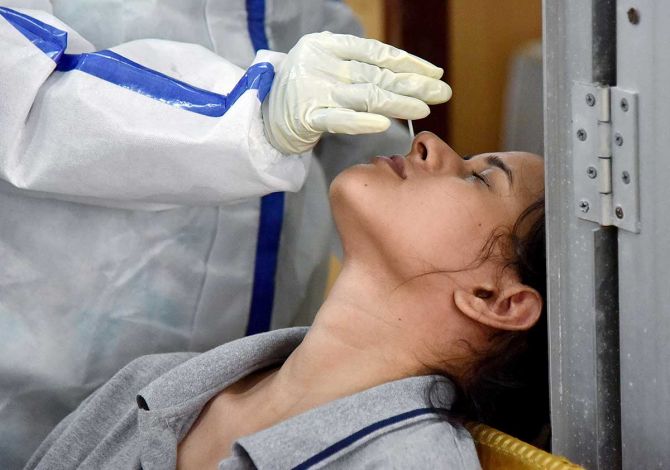Do not lose crucial time to begin treatment for Mucormycosis, insists Dr Sanket Jain, consultant pulmonologist, Masina Hospital, Mumbai.

Kindly note the image has been posted only for representational purposes. Photograph: Rahul Singh/ANI Photo
Mucormycosis, recently better known as the Black Fungus, has been the rising cause of concern in the past few weeks.
The rare and fatal infection affects your skin, lungs, sinuses and the brain.
People of all age groups are at equal risk, especially if your immunity is weak and if you are dealing with an existing medical condition.
What is Mucormycosis?
Mucormycosis, previously known as Zygomycosis, refers to a set of different diseases caused by infection with fungi or mould, named mucorales.
Typically, black fungus is caused by exposure to 'mucor' mould which is commonly found in soil, plants, manure, decaying fruits and vegetables.
It is omnipresent and found in soil, air and even in the nose and mucus of healthy people.
Doctors believe that Mucormycosis, which has overall mortality rate ranging between 50 and 85%, is being triggered by the use of steroids, a life-saving treatment for severe and critically ill COVID-19 patients.
Steroids lead to a drop in immunity, which is triggering these cases of Mucormycosis.
The key route of infection reaching our internal body parts is via inhalation of the fungus; other routes include ingestion and traumatic vaccination procedures.
Based on anatomic localisation, Mucormycosis can be classified into the following prominent forms:
- Rhinocerebral: This happens when the spores of the fungus are deposited in your nasal passage
- Pulmonary disease: When the spores or fungus enters your lungs, it can cause pulmonary damage.
- Cutoneous: When the fungus enters through interrupted skin, cuts or wounds
- Gastro Intestinal: When the fungus enters your stomach and intestine through food and liquids
Significant factors of infection
- Uncontrolled diabetes mellitus (high blood sugar)
- Infection risk through steroids
- Prolonged ICU stay
- Comorbidities -- patients who have undergone surgery, transplant or diagnosed with malignancy
- VoriConazole (a type of antifungal) therapy
- Neutropenia or lower number of white blood cells
Who is at risk?
Among COVID-19 patients, those who are diabetic and on steroids are likely to be infected with Mucormycosis.
Some of the common warning signs and symptoms would be:
- Pain and redness around eyes and/or nose
- Fever
- Headache
- Coughing
- Shortness of breath
- Bloody vomits
- Altered mental status
Besides the above signs, if you face any of the following symptoms, immediately consult your doctor:
- Sinusitis, nasal blockade or congestion, nasal discharge (blackish/bloody), local pain on the cheek bone
- One-sided facial pain, numbness or swelling
- Blackish discoloration over bridge of nose/palate
- Toothache, loosening of teeth, jaw involvement
- Blurred or double vision with pain, fever, skin lesion, thrombosis and necrosis
- Chest pain, pleural affusion, haemoptysis, worsening of respiratory symptoms
How to prevent risk: What you can do
- Do not ignore the warning signs and symptoms
- Control your blood sugar
- Monitor blood glucose level post COVID-19 discharge and also in diabetics.
- Use steroids judiciously. It is important to take the right quantity of medication at the prescribed time. Don't delay or overdo drugs without prescription or consulting an expert.
- Use clear, sterile water for humidifiers during oxygen therapy.
- Use antibiotics/antifungals judiciously.
- Do not hesitate to seek aggressive investigation as appropriate (KOH Staining and Microscopy Culture, MALDI-TOF is recommended) for detecting fungal etiology.
- Do not lose crucial time to begin treatment for mucormycosis. If early symptoms are ignored and not treated, the infection may spread from one part of the body to another through your blood vessels.

